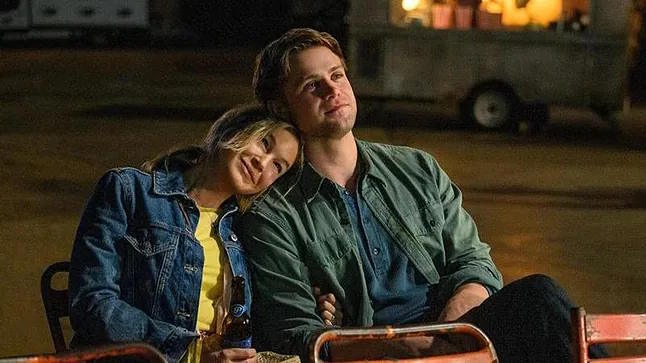Renée Zellweger is the only actress who truly looks when she closes her eyes. The contradiction, let's call it that, works for her and, if necessary, for the movie at hand. Indeed, Bridget Jones: Crazy About Him is one of those movies that no one expected, no one demanded, and, to continue with the analogy, no one watched. And perhaps that's why, because it was unexpected, because of the protagonist's insistence on looking at the viewer with closed eyes, the film manages to add to the surprise of its existence, the surprise of its correct and entertaining production. Surprise upon surprise, surprise on top of surprise. And with closed eyes.
Looking back, back to the early millennium when romantic comedies had not yet fallen out of favor, author Helen Fielding's book made its way to the screen in the best possible way. With boldness, a sense of rhythm, and a sugary (yet precise) political intention, director Sharon Maguire and Renée Zellweger managed to turn the wide panties into a feminist flag. The famous Bridget Jones's Diary skillfully and with moderate malice exposed each of the most painful impositions of what time has come to call patriarchy on women's bodies and aspirations. It sounds tremendous, and truly, at the time, it was just normal. It is now that we have become so meticulously reactionary that the most sensible demands have become tremendous. Before social media, it wasn't like this.
Soon, what was a discovery turned into an uneven saga, and we got used to seeing Jones grow through all stages of her existential chaos. The second installment was a disaster, but let's admit it, the third one wasn't bad. Now the tone changes slightly. Michael Morris's proposal (the first director in the series) aims to be more melancholic than assertive, more disillusioned than acerbic. The shift is understood (you know, age and all), but not entirely shared. Morris's excessive reverence for both the character and the lead actress results in a barrage of self-satisfied looks and nods to fans that detracts freshness and, above all, boldness from a movie too focused on itself. Probably, this is also a matter of age.
Bridget is now a widow. She lives with her two children, aged four and nine, and with the memory of Colin Firth (he is Mark in reality, but every time he appears on screen as a ghost, it is impossible not to see anyone other than Colin Firth). Her lifelong friends are her family. Them and the former lover played by an unbeatable Hugh Grant in what is his second youth as an actor. And they all push her to return to work, to try dating apps, to live and, we've arrived, to have sex. Naturally, it will go wrong. Or not as well as advertised.
Let's say the script unfolds exactly where it is known it will unfold shortly after the first scene. Or, better, from the moment the character played by Chiwetel Ejiofor appears on screen. But, and this is what matters, there are surprises. In fact, the most interesting parts are each of the moments when, as mentioned, it surprises and the movie closes its eyes like its lead actress and deviates from its most obvious path. Every appearance of Emma Thompson as a gynecologist is gold. And each of Grant's impertinences simply prove that this man currently excels at everything he touches. In other words: Is Hugh Grant there? Well, that's fine. With closed eyes.
Director: Michael Morris. Cast: Renée Zellweger, Chiwetel Ejiofor, Leo Woodall, Colin Firth, Hugh Grant. Duration: 126 minutes. Nationality: United Kingdom.
